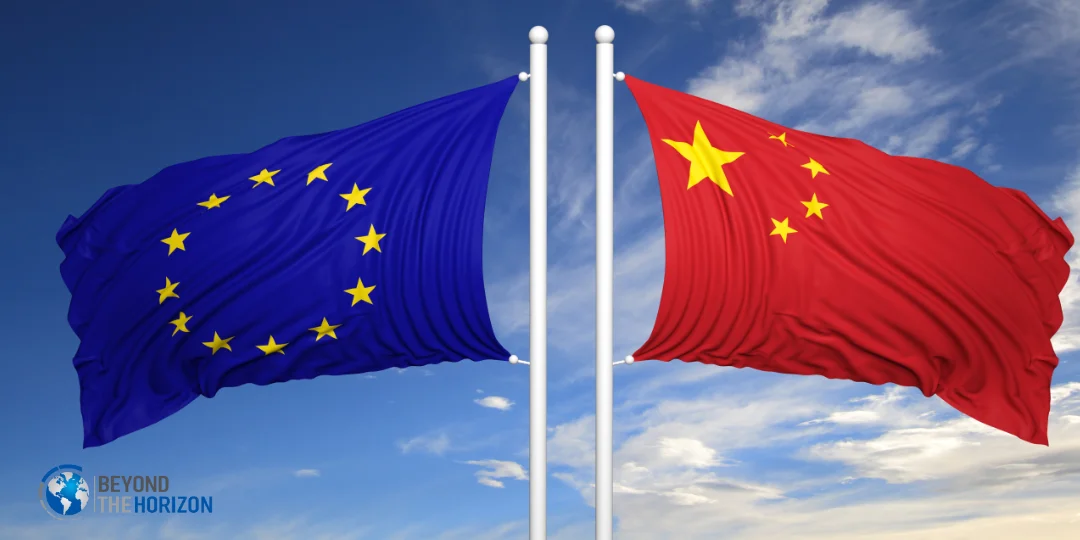Key Takeaways
- China is recalibrating its European diplomacy — offering trade and partnership to Germany and the UK while enforcing strict red lines on security, Taiwan, and public criticism.
- Germany’s “de-risking” drive collides with economic reality: Berlin remains deeply dependent on Chinese markets even as it tries to reduce exposure and protect key industries from Chinese overcapacity.
- Britain’s engagement is constrained by security politics: after the collapse of a major espionage case, MI5’s labeling of China as a “daily threat” and Five Eyes obligations have narrowed London’s space for détente.
- Beijing’s strategy is conditional engagement — cooperation is tied to political deference, especially on Taiwan and public discourse, while economic incentives are used to dissuade alignment with Washington.
- China is testing Europe’s “strategic autonomy” narrative, appealing to the EU’s desire for independence from U.S. policy while hoping this will translate into a softer China line — a gamble that may backfire as Europe hardens its stance.
- Europe’s security and economic spheres are converging, undermining Beijing’s effort to separate commerce from politics. Domestic pressures in Berlin and London increasingly fuse trade, technology, and national security concerns.
- The emerging dynamic is one of managed confrontation: diplomacy and business continue, but trust is evaporating. Europe and China are learning to live with persistent friction — neither breaking ties nor rebuilding true partnership.
Introduction
China’s recent diplomacy towards Europe’s two major powers – Germany and the United Kingdom – reveals a careful balancing act. Beijing has extended offers of strategic partnership and economic incentives to these countries, but at the same time drawn hard red lines on security issues and acceptable public discourse. In early November 2025, Chinese Foreign Minister Wang Yi held phone talks with his German and British counterparts following periods of high tension: in Berlin’s case, disputes over export controls and “de-risking” policies, and in London’s case, a collapsed China espionage prosecution and stark warnings from MI5. These episodes have highlighted a new reality in China-Europe relations. Beijing’s core message is unmistakable: keep doing business with China, resist aligning too closely with Washington’s containment agenda, and respect China’s “core interests” (especially regarding Taiwan and security). European capitals, however, are struggling to square their deep economic ties to China with growing political and security concerns at home. The result is an uneasy relationship that Beijing tries to label as “strategic cooperation,” but which increasingly resembles a managed confrontation – cooperation on the surface, with simmering distrust underneath.
Germany: Between De-Risking and Dependency
Germany’s relationship with China is arguably the most structurally important for Beijing in Europe. As China’s largest EU trading partner, Germany is a bellwether for the European Union’s evolving China policy. In its first-ever China strategy released in 2023, Berlin officially characterized Beijing as a “partner, competitor and systemic rival,” explicitly calling for reducing critical dependencies on China. This “de-risking” approach reflects Germany’s recognition that over-reliance on Chinese markets and inputs poses economic and security risks. Chancellor Olaf Scholz’s government (2018–2025) began pushing policies to diversify supply chains and protect sensitive sectors like semiconductors, even as German industry remained deeply entwined with China. By 2025, China had actually regained its status as Germany’s top trading partner after briefly being overtaken by the United States, underscoring the difficulty of untangling economic interdependence.
Against this backdrop, a diplomatic spat in late 2025 illustrated the new dynamic. German Foreign Minister Johann Wadephul (who took office in May 2025 under a new government) planned an official visit to Beijing in October with a pointed agenda. He intended to press China on its restrictions of rare-earth mineral and semiconductor exports and to insist on “fair trade” as a basis for the relationshipreuters.com. However, Beijing delivered what was widely seen as a snub: it confirmed only one substantive meeting for Wadephul – a meeting with Wang Yi himself – and offered no talks with higher-level Chinese leaders or other ministers. In response, Berlin abruptly postponed the trip at the last minute. The German side cited “constraints placed on rare earth exports” and the lack of meaningful engagements as reasons for the delay. The episode highlighted rising tensions over trade and security issues between Europe’s largest economy and China, and was interpreted in Berlin as retaliation for Germany’s tougher China stance.
A subsequent phone call on November 3, 2025, between Wang Yi and Wadephul was Beijing’s attempt at damage control – but also an opportunity to discipline German policy. According to official readouts, Wang Yi stressed that the One-China principle (i.e. non-recognition of Taiwan as a separate state) is “the most important political foundation” of China–Germany relations. He pointedly reminded Berlin that “China once unconditionally supported Germany’s reunification” and, having “experienced the pain of division,” Germany should reciprocate by fully understanding and supporting China’s efforts to safeguard its own sovereignty and territorial integrity. In essence, Beijing was urging Germany to toe the line on Taiwan – to oppose any form of “Taiwan independence” – as a condition for stable ties. Wang also warned against “megaphone diplomacy” or making “groundless/unfounded accusations” against China in public forums. This was a clear reference to German officials’ recent critical remarks on topics like China’s support for Russia or its aggressive moves in the Indo-Pacific, which Beijing wants handled privately rather than through media soundbites.
German officials downplayed the spat in public, with Wadephul expressing regret that his visit was postponed and affirming interest in dialogue with China at a later date. But underneath the diplomatic niceties, structural problems in the relationship remain unresolved. Germany’s trade imbalance with China has widened to record levels – a trade deficit forecast at around €87 billion in 2025, an all-time high. German exports to China are slumping (projected down over 11% in 2025), while Chinese imports to Germany continue to surge. In fact, Chinese exporters have been selling even more to Germany (up ~11% year-on-year) partly as a diversion from U.S. tariffs, flooding the German market with competitively priced electric vehicles, batteries, and green tech equipment. This trend has German industry alarmed – Chinese electric cars and solar panels are rapidly gaining market share in Europe, threatening key German sectors. Berlin’s strategy of de-risking – reducing dependence on Chinese suppliers – is thus colliding with Beijing’s insistence on political deference. China still wants German investment and access to European markets, but is increasingly unwilling to tolerate German criticism on security issues, Taiwan, or Beijing’s alignment with Moscow. The new normal seems to be an uneasy compromise: high levels of trade and diplomacy continuing, but under a shadow of strategic distrust and more frequent diplomatic frictions.
The UK: At a “Crossroads” Amid Security Alarm
If Germany embodies the economic complexities of Europe-China ties, the United Kingdom highlights the security tensions. In mid-October 2025, Britain’s domestic intelligence chief Ken McCallum (Director-General of MI5) bluntly described China as “a [national security] threat… yes, they [Chinese state actors] do [pose a threat], every day.”. This extraordinary public warning came on the heels of a collapsed espionage case that had caused political uproar in London. The case involved two British citizens – a parliamentary researcher and an academic – who had been charged with spying for Beijing between 2021 and 2023. In September 2025, prosecutors unexpectedly dropped those charges, citing a bizarre legal technicality: to prosecute under Britain’s Official Secrets Act (which criminalizes aiding an “enemy”), the Crown Prosecution Service needed evidence that the UK officially viewed China as an “enemy” or threat at the time – but such evidence was not provided. In fact, the previous Conservative government under Rishi Sunak had avoided formally designating China as a national security “threat,” using softer terms like “strategic challenge.” The lack of a clear designation meant the espionage trial could not proceed, an embarrassing loophole that let the suspects walk free.
The collapse of this high-profile spy case unleashed political recriminations in Britain. Prime Minister Keir Starmer – who took office with his Labour government in early 2025 – faced criticism from the opposition for supposedly being “soft” on China. In an unusual move to defend his government, Starmer publicly released internal witness statements from a Deputy National Security Adviser to prove there was no deliberate attempt to sabotage the case. Those documents did detail extensive Chinese “malign activities” in the UK, but notably still fell short of explicitly calling China a formal enemy. The Labour government argued that it was constrained by the terminology of the previous government – which had described China only as an “epoch-defining challenge,” not an enemy. Regardless, the political damage was done: the opposition portrayed Labour as prioritizing economic engagement with China over national security. Indeed, Starmer’s administration has advocated a nuanced “three Cs” framework for China (to compete, cooperate, and confront as appropriate) in pursuit of economic growth and collaboration on global issues like climate change. Critics seized on this as evidence that the new government was overly eager for a “positive” relationship with Beijing, potentially at the expense of security vigilance.
Beijing, for its part, has leveraged the espionage saga to reinforce its narrative that Western intelligence agencies are hyping a “China threat” without cause. After the spy case collapsed, China’s London embassy dismissed the UK’s released evidence as “rife with unfounded accusations” and insisted that “China never interferes in other countries’ internal affairs”. This war of words set the stage for the first call between Wang Yi and Britain’s new Foreign Secretary, Yvette Cooper, on November 6, 2025. According to Chinese accounts, Wang Yi told Cooper that China–UK relations are at a crossroads and must “either forge ahead or drift downstream” amid global turbulence. In other words, Beijing was urging London to make a choice: embrace a more cooperative, forward-looking relationship with China, or watch ties deteriorate further. Wang pressed for enhanced “strategic communication” and for keeping the relationship on a “healthy, mutually beneficial and stable track.” This is classic Chinese diplomatic framing – portraying China as the responsible partner advocating stability, while implying that any further strain in ties would be Britain’s fault for not meeting China halfway.
Despite Wang Yi’s cordial tone and talk of cooperation, the United Kingdom’s room for maneuver is limited. The British security establishment has already “moved on” to a markedly tougher view of China. Intelligence agencies like MI5 are publicly vigilant; McCallum made clear that MI5 has been actively disrupting Chinese espionage operations (“intervened operationally” in the past week) and “will never back off” from countering Beijing’s activities. Parliament is also increasing its scrutiny of Chinese influence: there are calls to strengthen the new Foreign Influence Registration Scheme by adding China to its enhanced tier (so far only Russia and Iran are explicitly targeted by the strictest reporting requirements). Lawmakers across parties are pushing for tighter controls on technology transfers and Chinese involvement in sensitive sectors, especially after incidents like the attempted takeover of a UK semiconductor plant by a Chinese firm. Moreover, Britain cannot ignore its Five Eyes intelligence alliance obligations and the expectations of its closest ally, the United States. U.S. officials (and indeed some British MPs) have voiced dismay at the collapse of the UK’s spy case, suggesting it could undermine allied efforts to hold Beijing accountable. In short, even as Prime Minister Starmer may wish to stabilize and “depoliticize” ties with China (for trade, investment, or climate cooperation), he faces heavy constraints. The UK’s security apparatus and political consensus have shifted toward caution on China, aligning more closely with Washington’s hard line. Beijing’s current approach – a mix of diplomatic charm towards the British government and sharp rebuttals of UK security claims – does little to resolve this fundamental gap. The result is that London–Beijing relations remain in a tenuous state: high-level exchanges continue, but trust is thin and any new incident could spark confrontation.
China’s European Playbook: Conditional Engagement and Strategic Wedges
Viewed together, Beijing’s handling of the Germany and UK cases reveals a coherent playbook in its approach to Europe. While the atmospherics differ (more emphasis on economic partnership with Germany, more on restoring trust with the UK), several common elements stand out:
- Engagement is explicitly conditional on political deference. China has made it clear that deeper cooperation with European countries comes with strings attached. Wang Yi linked any improvement in ties to Europe respecting China’s “core interests” – above all, Taiwan – and dialing down public criticism of Beijing. The rebuke of German “megaphone diplomacy” (i.e. publicly lecturing China) and the chiding of UK security rhetoric are not mere complaints; they are warnings that if Europe continues to cast China as a threat or condemn its policies (on human rights, the South China Sea, etc.), there will be diplomatic or economic consequences. In effect, Beijing is attempting to discipline European discourse: disagreements should be handled quietly and “properly,” or else the cooperative part of the relationship will suffer.
- Economic levers remain central to China’s strategy. Beijing still sees access to China’s huge market and investment opportunities as its biggest carrots vis-à-vis Europe. With Germany, China’s immediate concerns include Berlin’s talk of export controls on tech exports and the EU’s moves to investigate Chinese industries (such as the recent probe into Chinese electric vehicle subsidies). Chinese leaders are anxious that Europe’s de-risking could harden into outright protectionism against Chinese products. They have reason to worry: the EU has already imposed higher tariffs on some Chinese goods and is weighing measures against the flood of Chinese EVs and green tech equipment that European producers call unfair competition. China’s messaging to Germany has therefore emphasized keeping trade open – reminding Germans of the mutual benefits of partnership and warning that curbing trade or investment would hurt both sides. In the UK’s case, China regards Britain as a secondary (but still valuable) economic player – London is a global financial center and was once a champion of engaging China. Beijing would like to prevent Britain from cutting off financial ties or joining U.S.-led technology restrictions. Thus, Wang Yi speaks of “sustainable development of bilateral relations” and cooperation in areas like trade, finance and climate, subtly encouraging the UK to maintain an open-door approach. Underlying this is an attempt to drive a wedge between European economic interests and U.S. security policies: China wants EU countries to feel they can prosper through links with China even if Washington is trying to contain China’s rise.
- Appealing to Europe’s “strategic autonomy” narrative. Chinese diplomats frequently invoke language that resonates with Europe’s desire for an independent global role. In official readouts, Wang Yi has stressed that China and European powers like the UK and Germany are major countries with shared responsibilities – for example, as permanent members of the UN Security Council – and should work together on global challenges. He highlights principles like upholding the UN-centered international order, respecting sovereignty, and promoting free trade, implicitly aligning China with values that Europeans profess. The subtext is an appeal to the EU’s notion of strategic autonomy – the idea that Europe should not simply follow the U.S. lead, but define its own approach to China. Beijing is essentially testing whether this European aspiration for autonomy can translate into a softer line on China. Will Berlin and London resist an American-style containment policy and instead choose more accommodation with Beijing? China is hopeful that economics and a sense of diplomatic independence might make Europe a weak link in the Western front against China. However, this is a risky bet: so far, the EU has actually been toughening its stance on issues like economic security, human rights (e.g. sanctions over Xinjiang), and screening of Chinese investments – suggesting that Europe’s autonomy does not necessarily mean pro-China.
- Attempting to compartmentalize security frictions and economic ties – but only on Beijing’s terms. A core theme in China’s approach is compartmentalization: urging Europeans to isolate “irritants” like espionage accusations, military tensions, or human rights criticisms from the broader economic and diplomatic relationship. In Wang Yi’s words to the UK, differences and “occasional noises and disturbances” are “normal,” and should be handled calmly and “actively and prudently,” so that they do not derail the “main tone” of cooperation. In practice, Beijing wants Germany to continue business as usual – keep buying Chinese goods and investing in China – while muting its objections to China’s partnership with Russia or its behavior in the Indo-Pacific. Likewise, China wants Britain to treat incidents like spy scandals or interference fears as minor issues to be managed quietly, rather than reasons to curtail engagement. The problem for Beijing is that Europe’s domestic politics are moving in the opposite direction: rather than compartmentalizing, European governments are increasingly intertwining security and economics. Germany’s new export controls on sensitive technologies, the EU’s investment screening mechanisms, and Britain’s foreign influence laws all reflect a determination to let security concerns dictate certain limits on economic interaction with China. In other words, Europe is less willing to say “we disagree politically but it’s just business.” For many in Europe, high-tech trade, critical infrastructure, and even supply chain dependence on China are now seen through a security lens. This runs directly counter to China’s preferred “economics-first” framework.
Conclusion
Beijing’s outreach to Germany and the UK in late 2025 is not a traditional charm offensive – it is better described as a calibrated effort to stabilize relations on China’s terms. In both cases, the message from Beijing has been consistent: we can continue to cooperate, but only if you, Europe, refrain from crossing China’s red lines. Those red lines include public criticism of China’s system and policies, actions to limit China’s access to technology or markets, and any political moves regarding Taiwan that China perceives as support for “separatism.” Cooperation is offered, but it’s conditional on a degree of European acquiescence. Wang Yi’s emphatic reminders about One-China, and his warnings against treating China as a “threat,” underscore this conditionality.
The fundamental mismatch is that Europe’s trajectory is not aligning with Beijing’s wishes. Germany’s drive to de-riskits economy from China and protect its industrial base, and Britain’s securitized view of China as a daily espionage threat, both point to Europe doubling down on caution. European public opinion has also soured on China in recent years, due to issues like Xinjiang, Hong Kong crackdowns, and China’s stance on the Ukraine war. All these factors narrow the space for the kind of compartmentalized, economics-only relationship that China is trying to preserve. European leaders may prefer not to use inflammatory language – for instance, Berlin and London will say they are “competing” with China or have concerns, rather than calling China an outright enemy – but their policies are unmistakably hardening. The EU is developing new tools to screen investments and restrict exports of critical technologies to China. NATO has started to address challenges posed by China. Even traditionally business-focused countries acknowledge the need for “reducing dependencies,” echoing the language of de-risking.
Going forward, a clean break between Europe and China is unlikely – their economic linkages are too significant and neither side truly desires a total rupture. Conversely, a return to the “golden era” of unbridled engagement is equally improbable under current conditions. What is emerging instead is a grinding hybrid relationship: frequent diplomatic interactions and intermittent economic deals, paired with a thick undercurrent of distrust and defensive measures. We can expect to see high-level visits resume, and European companies will continue doing substantial business in China. But at the same time, Europe will keep fortifying its safeguards against perceived risks from China, and Beijing will push back whenever those safeguards infringe on what it sees as its prerogatives.
In sum, China’s European approach now is about managing friction – preventing disagreements from exploding – while strenuously avoiding any rupture that could sever economic ties. Beijing is trying to walk a fine line: offer just enough reassurance and incentive to keep Europe from joining a U.S.-led hard containment strategy, yet not yield on any of China’s own core interests. Europe, for its part, will continue the delicate dance of engaging with China where it must (trade, climate, global finance) but confronting China where it feels it must (security, values, technological rivalry). The coming years will likely see this uneasy equilibrium tested repeatedly by events. Each side will be watching closely to see whether the other is willing to adjust – or whether a more fundamental recalibration in China-Europe relations is inevitable. The one certainty is that strategic trust is in short supply; without it, Beijing’s vision of “strategic cooperation” will remain fragile, and the relationship will look more like a controlled contest to prevent a full-blown breakdown.






